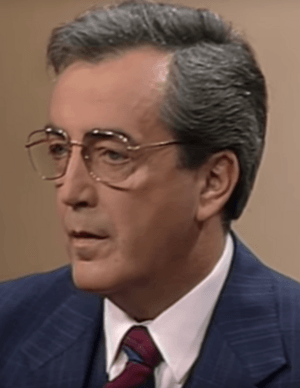Alois Mock facts for kids
Quick facts for kids
Alois Mock
|
|
|---|---|

Alois Mock, speaking in 1986
|
|
| Vice-Chancellor of Austria | |
| In office 21 January 1987 – 24 April 1989 |
|
| Chancellor | Franz Vranitzky |
| Preceded by | Norbert Steger |
| Succeeded by | Josef Riegler |
| Minister of Foreign Affairs | |
| In office 21 January 1987 – 4 May 1995 |
|
| Chancellor | Franz Vranitzky |
| Preceded by | Peter Jankowitsch |
| Succeeded by | Wolfgang Schüssel |
| Minister of Education | |
| In office 2 June 1969 – 21 April 1970 |
|
| Chancellor | Josef Klaus |
| Preceded by | Theodor Piffl-Percevic |
| Succeeded by | Leopold Gratz |
| Personal details | |
| Born | 10 June 1934 Euratsfeld, Lower Austria, Austria |
| Died | 1 June 2017 (aged 82) Vienna, Austria |
| Cause of death | Complications from Parkinson's disease |
| Political party | Austrian People's Party |
| Education | University of Vienna |
Alois Mock (born June 10, 1934 – died June 1, 2017) was an important politician from Austria. He was a member of a political group called the Austrian People's Party (ÖVP). From 1987 to 1989, he served as the Vice-Chancellor of Austria, which is like a second-in-command leader for the country. He also worked as the foreign minister and played a big part in Austria joining the European Union.
Contents
Alois Mock's Life and Career
Early Life and Education
Alois Mock was born in Euratsfeld, a town in Lower Austria. His parents were August and Mathilde Mock. He went to the University of Vienna to study law. Later, he learned about laws between different countries in Bologna, Italy, and Brussels, Belgium.
Starting in Politics
In 1961, Alois Mock began helping Josef Klaus, who was the leader of Austria at the time. He advised Klaus on important topics like the European Economic Community (EEC) and EFTA, which were groups that helped countries trade with each other. From 1962 to 1966, he worked for Austria at an international group called the OECD in Paris. This group helps countries work together on economic issues.
In 1966, he became a special assistant to Chancellor Klaus. From 1969 to 1970, he was the youngest education minister in Austria's history.
Becoming a Leader
After the elections in 1971, Alois Mock became a member of parliament. He also served as the mayor of his hometown, Euratsfeld. For many years, he led important groups within the Austrian People's Party (ÖVP). From 1979, he became the main leader of the ÖVP party itself. He also led international groups like the European Democrat Union (EDU) and the International Democratic Union (IDU).
Key Achievements
In 1987, Alois Mock became the Vice-Chancellor of Austria in the government led by Franz Vranitzky. He also served as the foreign minister from 1987 to 1995. During this time, he was very popular in Austria.
One of his most famous actions happened in June 1989. He and his Hungarian colleague, Gyula Horn, cut the barbed wire fence that was part of the Iron Curtain near Sopron. The Iron Curtain was a border that separated Communist countries in Eastern Europe from Western Europe. This act was a symbol of freedom and helped thousands of people from East Germany escape to the West in the months that followed.
Alois Mock also played a big role in Austria joining the European Union. In 1991, he strongly encouraged leaders like Hans-Dietrich Genscher and Helmut Kohl to recognize Croatia and Slovenia as independent countries.
In 1989, he helped start a group called the Pentagonale, which later grew into the Central European Initiative (CEI) with many more countries working together.
Later Life
Alois Mock retired from parliament in 1999 because of Parkinson's disease, a health condition that affects movement. He passed away on June 1, 2017, at the age of 82, due to complications from this disease.
Honours and Awards
Alois Mock received many awards and honours from Austria and other countries for his important work. Some of these include:
- Grand Gold Medal with Ribbon for Services to the Republic of Austria
- Golden Commander's Cross with the Star of Honour for Services to the province of Lower Austria
- Grand Cross of Merit of the Federal Republic of Germany
- Grand Cross of Merit of the Italian Republic
- Legion of Honour (France)
- Grand Order of King Dmitar Zvonimir (Croatia)
- Order of the Rising Sun (Japan)
 | Chris Smalls |
 | Fred Hampton |
 | Ralph Abernathy |

